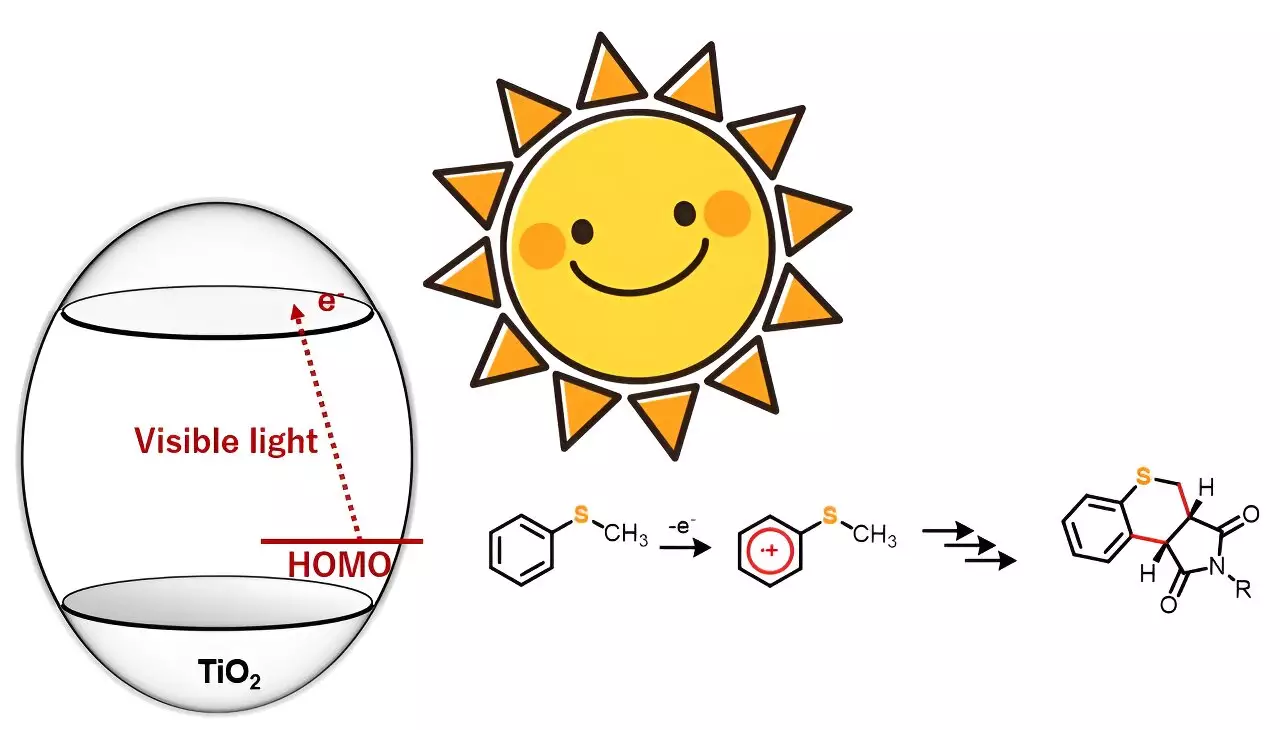

The synthesis of heterocyclic compounds plays a pivotal role in the chemical and pharmaceutical industry due to their versatility and potent physiological activities. However, current methods for synthesizing these compounds often involve high temperature and pressure conditions, as well as the use of precious metal catalysts. These conditions contribute to the economic and environmental costs of producing heterocyclic organic compounds. In an exciting development, a team of researchers from Japan and Bangladesh recently proposed a simple yet effective method to overcome these challenges. Their innovative study, published in the journal Advanced Synthesis & Catalysis, utilizes photocatalyst titanium dioxide (TiO2) and visible light for the synthesis of sulfur-containing heterocyclic compounds. This groundbreaking research has the potential to revolutionize organic synthesis and promote a more sustainable chemical industry.
The research team, led by Professor Yutaka Hitomi from Doshisha University, discovered the unique properties of TiO2 as a photocatalyst for driving organic reactions without the need for ultraviolet light. By harnessing the power of visible light, the team achieved selective one-electron oxidation of sulfur-containing organic compounds under anaerobic conditions. This innovative approach allows for various organic chemical reactions, making TiO2 an attractive alternative to conventional methods.
To demonstrate the effectiveness of their method, the researchers selected five 4-substituted thioanisoles and four N-substituted maleimides for the annulation or ring formation reactions. Initially, blue light alone did not induce any reaction. However, when TiO2 was introduced into the system, the team successfully synthesized 20 different thiochromenopyrroledione derivatives with moderate-to-high yields. Most notably, the reaction between thioanisole and N-benzylmaleimide achieved a yield of 43%, which was close to the theoretical maximum yield of 50%. This remarkable achievement highlights the potential of visible light-driven technology for the accessible and affordable synthesis of pharmaceuticals.
Through their research, the team gained valuable insights into the mechanistic aspects of the reactions. The charge transfer from thioanisole to the conduction band of TiO2 was observed, leading to the one-electron oxidation of thioanisole and subsequent generation of α-thioalkyl radicals through deprotonation. These findings shed light on the chemistry behind complex heterocyclic compound synthesis and open up new possibilities for energy-efficient industrial chemical processes.
The development of a sustainable chemical industry motivated this study by Professor Hitomi and his team. By utilizing visible light photocatalysis with TiO2, this innovative approach offers a promising path towards reducing resource-intensive processes and promoting energy efficiency. The widespread adoption of this technology has the potential to transform multiple chemical industries and enable the accessible and affordable synthesis of pharmaceuticals. The positive impact on the health and well-being of millions of people worldwide cannot be understated.
The synthesis of heterocyclic compounds is crucial in the field of organic chemistry, and the conventional methods used often come with significant economic and environmental costs. However, the recent research conducted by Professor Hitomi and his team introduces a game-changing approach for sustainable organic synthesis. Through the utilization of visible light photocatalysis with TiO2, the team successfully synthesized sulfur-containing heterocyclic compounds with excellent yields. Their findings provide valuable insights into the mechanisms involved, offering a pathway towards a more energy-efficient chemical industry. This breakthrough research has the potential to revolutionize the synthesis of pharmaceuticals and other complex organic compounds, ultimately benefiting society as a whole. The future looks bright for sustainable organic synthesis, thanks to the innovation and dedication of these researchers.
A groundbreaking expedition led by an international research team, featuring esteemed scientists from the University…
The pursuit of coherent control over wave transport and localization stands as a monumental challenge…
In recent astronomical explorations, researchers have unearthed a striking phenomenon emanating from a distant corner…
The quest for sustainable practices within the chemical industry is more critical than ever. Researchers…
In the complex interplay of human health, the relationship between the gut and the brain…
The relentless drive for sustainable energy solutions has fueled remarkable advancements in solar technology, with…
This website uses cookies.